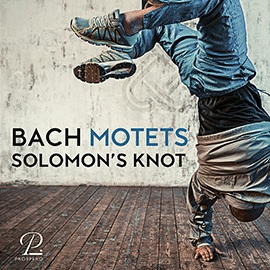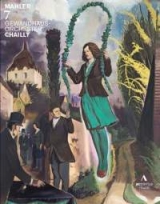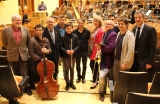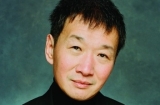ICMA, International Classical Music Awards has published today the winner’s name of the Recording of the Year 2016. It is the winner from the category Video Performance, with Gustav Mahler’s Symphony No. 7 played by the Gewandhausorchester Leipzig under the baton of Riccardo Chailly on Accentus Music (ACC20309 42). The Jury says: « Riccardo Chailly is one of the most interesting interpreters of Gustav Mahler’s symphonic cosmos. His account of the Seventh Symphony shows a superior sense for the formal complexity and the significant contrasts of the work. Read More →
In celebration of April Fools’ Day, the Detroit Symphony Orchestra (DSO) musicians have shed their traditional concert tails (which have been the ensemble’s official concert attire for the last 129 years) in favor of Carhartt bib overalls to promote its goal to be the most accessible orchestra on the planet… Read More →
Der Deutsche Bühnenverein fordert in einer Pressemitteilung die Stadt Hagen auf, zu einem sachgerechten Umgang mit dem dortigen Stadttheater zurückzukehren. « Was sich zurzeit in Hagen kulturpolitisch ereignet, ist haarsträubend und kurzsichtig“, äußerte Rolf Bolwin, Direktor und Vorstand des Deutschen Bühnenvereins, heute in Köln. Read More →
The International Classical Music Awards (ICMA) organize their Award Ceremony and Gala Concert today, April 1st, at the Kursaal in San Sebastian, hosted by the Euskadi Symphony Orchestra conducted by Jun Märkl and San Sebastian 2016, Cultural capital of Europe. Read More →
Dutch cellist Harriet Krijgh has been appointed Artistic Director Designate of the International Chamber Music Festival Utrecht beginning in summer 2017. After 13 successful festivals the founder Janine Jansen passes the baton to the 24-year-old musician. Read More →
The Gala concert of the International Music Awards 2016 takes place today, 01 April, at the Kursaal in San Sebastian. The event is hosted by the Euskadi Orchestra (Basque National Orchestra) and Donostia 2016. The audience will experience two premieres. It is the first time that ICMA are able to present a world premiere performance, since the Artist of the Year, Christian Lindberg, has written a piece especially for this evening, The Tale of Kundraan. Read More →
Italian mezzo Cecilia Bartoli doesn’t like to board a plane. She told the magazine Gramilano that, whenever possible, she is travelling by train or by sea. To go to New York, the singer took the Queen Elizabeth. She even told the reporter: « When I went to St Petersburg I took a train from Switzerland to Lübeck in Germany, where I boarded an icebreaker which got me there in three days. »
The European contest for percussion solo and low brass instruments (trombone, althorn, baritone, saxhorn, euphonium, tuba) will be organized by Luxembourg’s music association UGDA on Sunday, 13th of November 2016, at the Conservatoire of Luxembourg-City. Six different levels (four in percussion) are proposed to enable beginners as well as advanced soloists to participate in the competition. Contestants aged not over 26 years may enter. Application will be closed on October 10th, 2016. Read More →
There is more news in the case of the transformations at the Paris Opera Garnier. The management of the opera house wanted to eliminate some separation walls in order to get more seats. Now, because the old separation walls were not stored, but rather destroyed without any authorization, and the transformation work does not fulfill the requirements of historic buildings, the case is finally transferred to the Criminal court. Read More →
In an interview with ‘classicfm’ pianist Melvyn Tan has said something remarkable, which music students should take in consideration. « … another way is to learn how to practise. A lot of students don’t really know how to practise. The way to practise, I think, is to really listen to yourself, but in a very analytical way. So you almost don’t think of the musical emotions in the piece, but you’re thinking of being able to project each note, thinking about why the composer wrote certain sequences of notes. And then you apply it to a much bigger canvas, you apply the colour and then emotions – and that is a long process. »


























